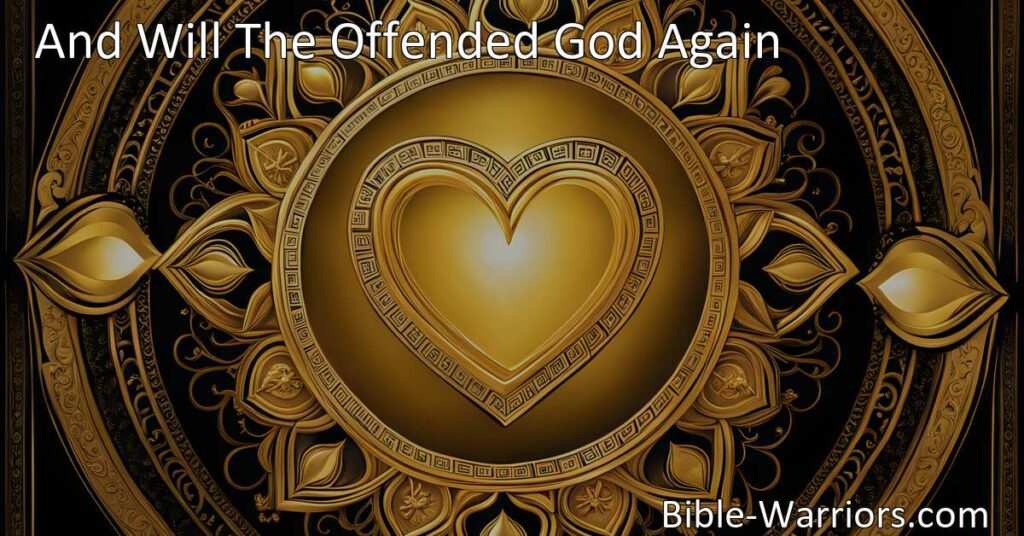And Will The Offended God Again – Hymn Lyric
“Will the Offended God Return to Dwell Among Sinful Men?” In this hymn, doubts and worries about God’s forgiveness and acceptance are addressed, as the writer ponders if God will once again reside with sinful humanity. Despite our faults, the hymn assures us that God’s mercy knows no bounds and that He desires to establish a temple within us that praises Him. The hymn inspires hope and reminds us of our worthiness of God’s love and forgiveness.
Table of Contents
And Will The Offended God Again
And will the offended God again return,
And dwell with sinful men?
Will he within this bosom raise,
A living temple to his praise?
The joyful news transports my breast,
All hail! I cry, thou heavenly guest!
Lift up your heads, ye powers within,
And let the king of glory in.
Enter with all thy heavenly train,
Here live, and here forever reign:
Thy scepter o’er my passions sway,
Let love command, and I’ll obey.
Reason and conscience shall submit,
And pay their homage at thy feet:
To thee I’ll consecrate my heart,
And bid each rival thence depart.
Meaning of And Will The Offended God Again – Hymn Lyric
Return and Dwell with Sinful Men?
In times of doubt and worry, we often question if a forgiving and loving God will once again come back to dwell among us, sinful human beings. It seems unfathomable that the Almighty would want to reside within the brokenness of our hearts. Yet, this hymn reminds us that there is hope, that God’s mercy knows no bounds, and that He is eager to establish a living temple within us, one that would be a testament to His praise.
The opening verse of this hymn immediately fills our hearts with joy and the promise of restoration. It declares, “And will the offended God again, return and dwell with sinful men?” This question may seem rhetorical, but it ignites a flame of hope within us, assuring us that despite our faults and transgressions, God’s desire to be in communion with us remains constant. It poses a challenge to our understanding of divine forgiveness and acceptance.
As the hymn progresses, we can feel the excitement building within the writer’s heart. They express their delight, exclaiming, “The joyful news transports my breast, all hail! I cry, thou heavenly guest!” In this moment, the hymn becomes a personal conversation between the writer and their Creator. The writer acknowledges the incredible honor of having God, the heavenly guest, come and reside within their very being. This understanding fills their heart with overwhelming gratitude and gladness.
The hymn continues by urging the powers within us to lift up their heads and welcome the King of glory. It is a call to let go of any selfish desires or sinful urges that hinder the presence of God within us. The writer invites all the heavenly train to enter and make their abode with us, promising, “Here live, and here forever reign.” This line not only expresses the longing for God’s constant presence but also highlights the eternal commitment the writer desires to make to the heavenly guest.
Central to the hymn is the recognition that for God to dwell within our hearts, there must be a shift in power. The writer understands that their own passions and desires must be subject to the rule of God’s love. They acknowledge, “Thy scepter o’er my passions sway, let love command, and I’ll obey.” This surrender of control demonstrates the humility and devotion required to create a suitable dwelling place for God. It acknowledges the need for God’s guidance and allows His love to become the guiding force in their life.
Furthermore, the hymn emphasizes the vital role of reason and conscience in this divine union. The writer beautifully states, “Reason and conscience shall submit and pay their homage at thy feet.” Here, reason and conscience are seen as essential components in creating a harmonious dwelling place for God. They must align themselves with God’s will and acknowledge Him as the supreme authority. Through this surrender, the writer seeks to consecrate their heart solely to God, driving out any rivals or distractions that vie for attention and affection.
While this hymn speaks to the personal relationship between the writer and their Creator, it also resonates with a broader message for humanity. It reminds us that we are all capable of being vessels for God’s presence. The invitation to let the King of glory in extends to each one of us. It offers hope that God’s forgiveness and grace are available to us all, regardless of our past mistakes or shortcomings.
In conclusion, this hymn paints a beautiful picture of God’s willingness to dwell within humanity, despite our inherent fallibility. It envisions a transformed heart, where reason, conscience, and passions align with God’s love and command. It encourages us to open ourselves up to God’s presence and to consecrate our hearts to Him, bidding all rivals to depart. It is a reminder that we are all deserving of God’s mercy and that His desire to be in communion with us is unwavering. So, let us welcome the heavenly guest within our hearts and forever rejoice in His loving presence.
I hope this hymn inspired image brings you hope and peace. Share it with someone who needs it today!



